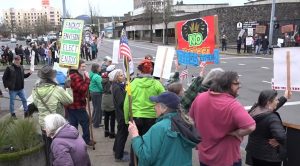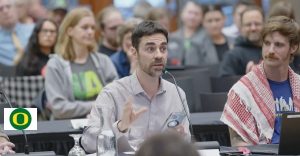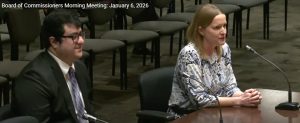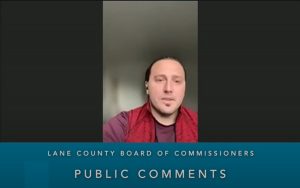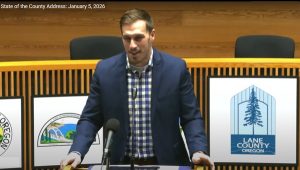Public comments urge progress on climate goals
8 min read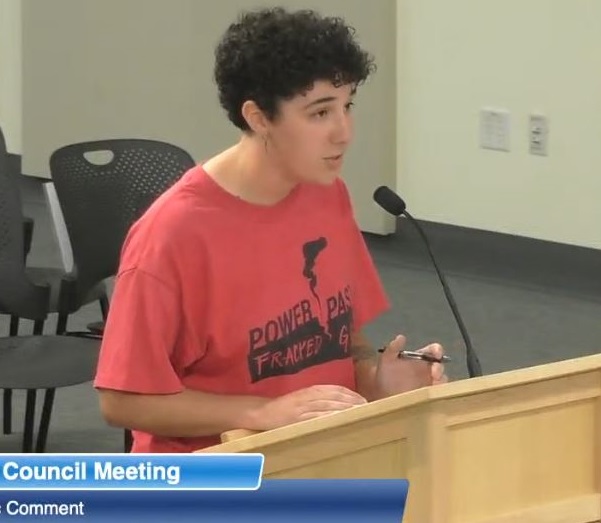
Public comments note that the city of Eugene is far from meeting its climate goals. On May 13:
Jack Dodson: My name is Jack Dodson. I’m a student at the University of Oregon. I’m also an organizer with the UO Climate Justice League. For over seven years, students have been strongly advocating for the University of Oregon to take action to transition our boiler system off of gas and onto renewable energy. We appreciate the Eugene Sustainability Commission’s memo regarding this issue. Unfortunately, the University leadership has not acted on the recommendation of their own Thermal Task Force or on the recommendation of the Eugene Sustainability Council.
[00:00:36] So we call on the City Council to weigh in on this issue, recommending the University to begin its thermal transition now. While these emissions originate on campus, they impact all of Eugene. In fact, the boiler system is the single largest source of greenhouse gas emissions in Eugene. Reducing these emissions would help Eugene meet the goals in its climate recovery ordinance, which includes the reduction of fossil fuel use in the city by 50% of 2010 values by 2030.
[00:01:05] There are a lot of UO students working to pressure the University to update its boiler system, but the University has been incredibly reluctant to act, so we would love as much off-campus support as we can get. Again, these greenhouse gas emissions from campus negatively affect everyone in Eugene, so if the city of Eugene itself pressured the University to reduce its emissions, it can make a huge difference. The students are already fighting for a better future. It’s time for the adults in positions in power, like yourselves, to help out.
[00:01:39] I also urge the city of Eugene to move forward with one or more alternative pathways to electrify Eugene homes and buildings as quickly as possible. The unfortunate delays already caused by the misguided Berkeley ruling have prevented our community from benefiting from the climate health and economic benefits of electrification. And we must act now to meet our climate goals.
[00:02:00] Michael Carrigan: I’m Michael Carrigan. I urge Council to move forward as soon as possible with one or more pathways to electrify Eugene’s homes and buildings. We’ve already experienced significant delays that prevented our community from enjoying the benefits that come from electrification. I want a livable future for my 25-year-old daughter. I think she has earned the right to a future. So, so please, please take action as soon as you can.
[00:02:33] Adrienne Rizzo: My name is Adrienne Rizzo and I’m a student over at UO pursuing a degree in environmental science and I am a veteran of the United States Marine Corps. Thank you for focusing on building electrification to set policies that phases out unhealthy and unsafe indoor air pollution.
[00:02:49] This is an area where cities are leading the way and your leadership despite setbacks is extremely important for Oregonians’ health, safety, and climate goals. And while I genuinely appreciate the climate mitigation and adaptation work of Council and city staff, I worry that our progress locally and beyond is not at the scale and speed that we need. I don’t think I have to explain the worsening climate impacts that have already begun. We can see it and feel it. And every day more and more reports are coming out about how many countries and how many states and cities are not on track to meet their climate change mitigation goal.
[00:03:27] And just a couple of days ago the city of Eugene reported that the drop in overall community greenhouse gas emissions lags far behind the 7.6% annual reduction target. I’m worried that Eugene isn’t doing enough to prevent some of these changes that are going to affect people’s lives and livelihoods within the city and that have the potential to completely change the landscape here.
[00:03:52] I worry that we could lose our iconic surroundings that help shape the way people identify as being a part of the Pacific Northwest and also that draw tons of people to our beautiful city. I worry that if Eugene doesn’t push harder to make positive changes, we will become not only unlivable, at least for those of us in lower tax brackets, but it’ll also become unrecognizable.
[00:04:16] So what can we do? A recent RMI analysis on electrification in Eugene—and RMI is a great nonprofit research group on greenhouse gas emissions—it showed that transitioning a home to all-electric would on average reduce the home’s emissions by 70%. In our state, homes and buildings consume nearly 43% of all energy and cause about one-third of the state’s climate pollution. And gas burned in furnaces, water heaters, stoves is 17% of all fossil fuel emissions, if you count upstream.
[00:04:46] Carolyn Partridge: My name is Carolyn Partridge, I’m here to support the young people who are testifying tonight. I know their testimony won’t fall on deaf ears, but I’m afraid it will be met with ‘Yes, but.’
[00:04:58] Metaphorically speaking, their generation is arriving on earth at the end of an extravagant all-you-can-eat buffet. There’s little left to eat and the mess is enormous. Our past prosperity has been based on extracting natural resources from the earth, especially fossil fuels.
[00:05:17] And as I know you know, burning fossil fuels has completely upended climate stability. Almost daily, we learn of another deadly weather disaster with far-reaching consequences.
[00:05:30] Back in 1957, Dr. Roger Revelle testified before a congressional subcommittee about the possible dangers of increasing carbon dioxide levels in the atmosphere. That was 67 years ago. No wonder young people are impatient, frustrated, and even angry. Their futures get bleaker with every ton of carbon dioxide created. We must transition.
[00:05:57] Milla Vogelezang-Liu: My name is Milla Vogelezang-Liu, and I’m a senior at South Eugene High School. Eugene’s climate recovery ordinance was made in 2014 when I was eight years old. Since then, I have experienced forest fires, droughts, heat waves, poor air quality and ice storms, each occurring more and more frequently as I grew up. As a teenager, these events are scary and disheartening, making me fear for my future. It is undeniable that the climate crisis is upon us.
[00:06:25] That’s why I was overjoyed when Council leadership passed Oregon’s first-in-state electrification ordinance and voted to return to the issue in summer 2024. I urge you to proceed with the electrification of Eugene homes and buildings as swiftly as possible. We do not have time to waste. Every year, the climate crisis is worsening and we need to move quickly if we want to reduce our emissions by 50% by 2030.
[00:06:50] I also urge you to weigh in on the University of Oregon’s formal transition and to encourage them to transition to clean renewable energy. The University is the biggest emitter in Eugene. These emissions affect all Eugenians, especially youth and future UO students like my peers. We cannot make a just transition without the University’s involvement.
[00:07:12] To conclude, I ask on behalf of Eugene youth that you move forward with electrification in Eugene. My generation is already experiencing health problems, school closures, and dangers due to the climate crisis. We need to act. As youth, we look to you, our leaders, to make sure that we move towards a safe and sustainable future. I urge you to take swift action for the sake of me and my generation’s future.
[00:07:37] Logan Page: My name is Logan Page. I’m a physicist and graduate student at the University of Oregon. I’m proud to be a part of this community and I do appreciate the focus that the City Council has given so far to electrification. As lots of people have spoken on tonight, it is one of the most important issues that we can act on right now.
[00:07:57] In the 1950s, medical evidence suggested that smoking caused lung cancer. But tobacco companies denied this fact until 1998. In over 40 years, countless lives were lost due to their lies. They used the same marketing ploys, though, that the fossil fuel industry uses today. If I told you today that smoking three cigarettes a day would improve your health, you wouldn’t believe me. Then why would you believe it when someone tells you that natural gas is clean and sustainable energy?
[00:08:27] We know the harmful effects methane and carbon dioxide have on our environments and our individual health. We’ve known this for decades, but we’ve been tricked into inaction by clever marketing.
[00:08:39] We can’t let the fossil fuel industry delay this action any longer. As our City Council representatives, I urge you to represent your constituents’ best interests by continuing to push forward with electrification and renewable energy as quickly as possible.
[00:08:55] For several years, students at the University of Oregon, as you’ve already heard from another commenter, we’ve been advocating for the University to transition off of gas and onto clean renewable energy.
[00:09:05] But the University has largely chosen to ignore us. I’m grateful to the committee and the City Council for the memo that they’ve written regarding this issue already but due to the continued inaction of University leadership on this issue, I’d urge you to continue to weigh in to apply whatever pressure you can to recommend that the University begins this transition now.
[00:09:31] Cecilia Luzi: My name is Cecilia Luzi and I live in the county. I’m the communications coordinator for 350 Eugene and I support strong local policy to phase out the use of planet-heating fuels, especially fossil gas. As a young person, I’m concerned about the use of fossil fuels for many reasons. We all know that greenhouse gas emissions contribute to more extremes in weather.
[00:09:53] Last summer was the hottest on record, according to NASA, as a result of the fossil fuel industry continuing to dispose of its waste into our atmosphere, creating a blanket of heat that is dangerously heating the earth.
[00:10:07] As a gardener, I see the effects of this on my plants. Water scarcity and extreme heat make what is not only a hobby, but a way for me to feed my family, extremely hard. It makes me worry not only for my garden, but about bigger scale food insecurity, which will lead to higher prices on food I already struggle to afford as someone living paycheck to paycheck.
[00:10:28] The science is telling us we have two to three years at most, the end of this decade, to reach a 50% reduction in our fossil fuel use to avoid irreversible tipping points.
[00:10:39] I’m glad our city has a solid climate action plan, but we are far from our goals and we can and should act quickly. You don’t have unlimited power, but you do have significant avenues to improve health and safety through land use and safety regulations.
[00:10:56] As the health harms of fossil fuels have been reported, we see that gas appliances and especially gas stoves release harmful pollutants like carbon monoxide, nitrogen oxides and known carcinogens. This is something you have the power to impact by passing policy that mandates new residences source their energy from clean electricity.
[00:11:18] This will help meet our climate goals, making our indoor air safer. I’m asking you to demonstrate your resolve and take urgent action. Please act with courage and creativity, explore pathways such as restricting new gas piping in the city’s right of way, regulating outdoor NOx emissions and taxing carbon pollution.
[00:11:40] I urge you to take swift action to protect our climate and public health.
[00:11:44] John Q: Public comments warn that the city is falling behind on its climate goals. The Council is asked to take a look at the city’s largest source of greenhouse gas emissions: The University of Oregon.
